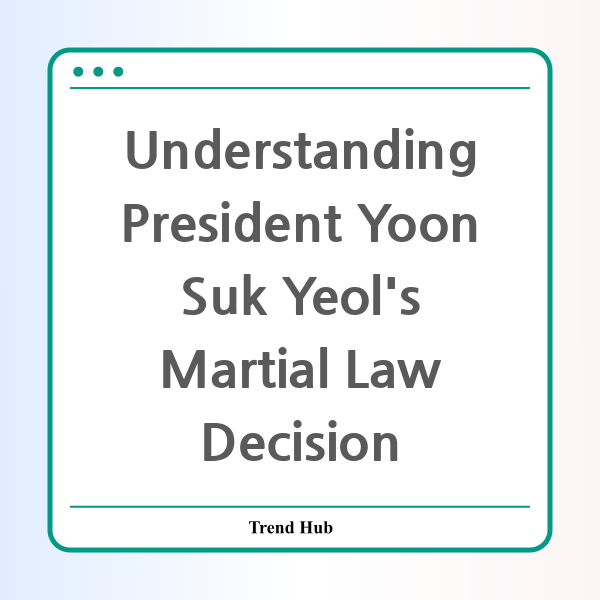* This website participates in the Amazon Affiliate Program and earns from qualifying purchases.

What motivated South Korean President Yoon Suk Yeol to declare martial law? This question echoes throughout the streets of Seoul as citizens grapple with the implications of a leader's drastic decision. The nation is witnessing both fervent support and vehement opposition, reflecting a deeply divided populace that is struggling to make sense of the unfolding political drama.
On April 4, 2025, President Yoon Suk Yeol was formally removed from office, setting off a wave of intense emotions among South Koreans. Joyous celebrations from his opponents collided with the despair of his supporters as thousands gathered in downtown Seoul to voice their opinions. The removal of Yoon has not only heightened tensions within political circles but also intensified the examination of his controversial martial law decree.
Yoon's supporters defend his martial law declaration as a necessary measure to confront opposition politicians whom they accuse of being sympathetic to North Korea and threatening South Korea's democracy. They argue that this extreme step was taken to protect the nation from potential threats posed by the North and to counteract what they view as an obstructive liberal opposition.
In stark contrast, critics of Yoon interpret his actions as a desperate attempt to deflect attention from mounting corruption investigations surrounding him and his wife. Allegations have surfaced regarding Yoon's involvement in influencing party nominations for the parliamentary by-election in 2022. This narrative is bolstered by the timing of various events, such as the indictment of an election broker just days before Yoon's decree, leading many to speculate about his motives.
The martial law declaration raises profound concerns in a country with a recent history marked by military dominance from the 1960s to the 1980s. South Koreans are acutely aware that deploying the military within a democratic society is a measure that should be applied with utmost caution. This history casts a long shadow over Yoon’s actions, leading many to question the stability and integrity of democracy in South Korea.
As presidential election campaigns begin, the fractures along political lines are likely to deepen. The Democratic Party, led by archrival Lee Jae-myung, has vehemently denied allegations of electoral fraud and has positioned itself as a defender of democratic values against what they see as the overreach of Yoon's administration. Meanwhile, Yoon's supporters continue to rally behind their leader, framing the martial law as an essential response to safeguard the nation’s sovereignty.
The political landscape is not just shaped by immediate allegations but also by broader issues. Socio-economic disparities, generational divides, and varying perceptions of national security complicate each faction's stance on Yoon's presidency and his recent actions. As South Koreans grapple with these issues, they also face the daunting reality of national security, especially in the context of ongoing tensions with North Korea and interactions with the United States and China.
In the coming weeks, the political climate will undoubtedly evolve as both factions prepare for an intensely contentious presidential election. The stakes are high, not only for the immediate future of South Korea but also for its core democratic principles and international relations. With strong emotions at play, the nation stands at a crossroads, uncertain of how the unfolding narrative will reshape its identity and governance.
In conclusion, President Yoon Suk Yeol’s declaration of martial law has sparked a national debate that reveals the complexities of South Korea's political landscape. As citizens continue to express their opinions and feelings regarding the past administration and the path forward, the essence of democracy itself hangs in the balance. Understanding the motivations and implications of Yoon's actions may very well be crucial in guiding South Korea towards a more united and stable future.
* This website participates in the Amazon Affiliate Program and earns from qualifying purchases.